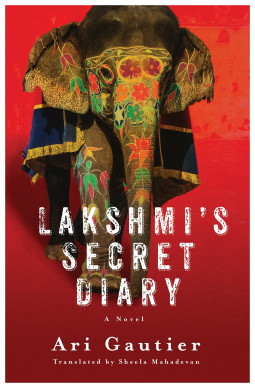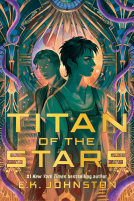
Lakshmi’s Secret Diary
A Novel
by Ari Gautier
This title was previously available on NetGalley and is now archived.
Send NetGalley books directly to your Kindle or Kindle app
1
To read on a Kindle or Kindle app, please add kindle@netgalley.com as an approved email address to receive files in your Amazon account. Click here for step-by-step instructions.
2
Also find your Kindle email address within your Amazon account, and enter it here.
Pub Date 10 Sep 2024 | Archive Date 27 Nov 2024
Talking about this book? Use #ColumbiaUP #NetGalley. More hashtag tips!
Description
Seeking to escape captivity, Lakshmi the temple elephant sets out on a stirring journey toward freedom. On her way, she briefly experiences life as a film star and encounters a colorful cast including a three-legged dog named Tripod Dog Baba, other elephants in the Bandipur Forest, a chameleon facing an existential crisis, a moon who dances with an elephant, and a flying fish called Alphonse.
Lakshmi’s Secret Diary is a remarkable Indian Francophone novel set in Pondicherry, the former capital of French India. Blending philosophical meditations, retellings of Sanskrit mythology, and social critique, Ari Gautier tells the story of Lakshmi’s attempt to escape her fate. From the point of view of animals, the novel explores concepts of destiny, freedom, and identity. It illuminates the paradoxes of animal-human relations in India, where animals are both abused and worshiped, and provides an imaginative critique of the caste system. Gautier’s vivid portrait of Pondicherry brings to life the religious, cultural, culinary, and visual diversity of the city’s districts and sheds light on the little-known history of French colonialism in India. An afterword explores issues such as reincarnation and Indian translation traditions in relation to the novel. At once tragic and comic, satirical and surreal, Lakshmi’s Secret Diary is a surprising, compelling, and moving novel from a gifted storyteller.
Ari Gautier is an Indian Francophone writer and poet from the former French Indian territory of Pondicherry, now based in Norway. One of the few contemporary Indian writers who adopts French as a primary literary language, he is also the author of the novel Le Thinnai and the short story collection Nocturne Pondichéry.
Sheela Mahadevan is lecturer in French and Francophone studies at the University of Liverpool.
Advance Praise
"What a magnificent and original novel, introducing the reader to a dreamlike world where the nature of India plays a major role."
—Maryse Condé, author of Segu and I, Tituba, Black Witch of Salem
"This is a tale that goes back through the ages, but that reaches out to us, now, as we subjugate nature to our own ends. Filled with humour, it is nonetheless heart-breaking."
—Ananda Devi, author of The Living Days
"Fusing history, memory, mythology, and the immediate present, Lakshmi’s Secret Diary is Ari Gautier’s gift to a lost humankind. Meditative and melancholy, whimsical and funny, it breaks free of its location in colonial Pondicherry to meditate on the human condition, on fate and freedom and choice. It lingers long after you’ve read it.
—Geetanjali Shree, International Booker Prize-winning author of Tomb of Sand
"Translating a text as subtly complex as Ari Gautier’s Lakshmi’s Secret Diary with the litheness of Sheela Mahadevan’s English is a considerable accomplishment. In her translation, Gautier’s Pondichéry is rich with unforgettable characters, history, and wisdom."
—Matt Reeck, translator of “Muslim”: A Novel
Available Editions
| EDITION | Other Format |
| ISBN | 9780231212052 |
| PRICE | US$24.00 (USD) |
| PAGES | 304 |
Available on NetGalley
Featured Reviews
 Reviewer 1376114
Reviewer 1376114
This is one of the most interesting books I've ever read in my entire life. We follow the main character who is a literal elephant. This novel is set in Indian and it's based on a mythology that I wasn't familiar with, so I can't say how well the author did its justice. But I thoroughly enjoyed this read.
Both whimsical and philosophical, this book follows an elephant determined to find her freedom.
Lakshmi is born into the temple elephant caste. But when she's sent away to training school, an escaped elephant living nearby opens her eyes to a whole new world. Soon, she's sneaking out to a hidden refuge for escaped elephants and eating fermented fruit with him, debating between her expected life at a temple and the uncharted life that awaits her in the forest.
This book incorporates Sanskrit mythology and a Hindu worldview, with some characters reincarnating over the course of the book. It was an interesting introduction to a world I didn't know much about - historical India - through the unique perspective of an elephant.
Lakshmi likes to think about the meaning of life and her experience of it, and along the way she meets a cast of characters who do the same: Tripod Dog Baba, a guru dog in her temple; a flying fish called Alphonse who's a soul reborn; and Manmath, a warrior elephant who shares the story of the downfall of his people. Life can be hard and tragic for elephants and dogs in India, and this book doesn't shy away from that reality. At times passages can be painfully sad.
I found myself rooting so hard for happiness for Lakshmi and Tripod Dog Baba.
Trigger warnings: animal abuse, animal death
 Reviewer 1179059
Reviewer 1179059
I received an ARC from the publisher in exchange for an honest review
Lakshmi’s Secret Diary by Ari Gautier is a first person POV Tamil Indian novel from the point of view of an elephant. Temple elephant Lakshmi wants to leave her life of captivity and live among the elephants that live in the wild. Along the way, she runs into the fantastical stories of several other animals and considers the caste system that all elephants are a part of.
I really suggest reading the translator’s afterword after finishing the book. There’s a lot of information on the history of France colonizing India, mythology, and discussing the traditions Gautier was working from. I learned a new word, ‘transcreation’, which is defined by translator Sheela Mahadevan as ‘a term that is frequently employed in the Indian context to describe the long-standing tradition of retelling and adapting Sanskrit mythology’ and, as suggested by G. Gopinathan, ‘as a rebirth or reincarnation (avatar) of the original work.’ I found this so interesting because it sounds a lot like ‘adaptation’ but has a specific nuance to it regarding Sanskrit mythology, so there are probably rules and ideas that are going to be unique to the transcreation movement and I would like to see more of it.
Of all of the animals’ stories, the two that were the most interesting were Veeran and his constant dance with the moon and a flying fish who wants to sit in the mouth of a kingfisher and see the world. Veeran’s story is tragic and romantic at the same time, constantly chasing his life as she waxes and wanes only for her to forget him because she is reborn every month. The flying fish paints a vivid picture of the world outside of his home and of what lies in Pondicherry. There’s yearning in both that ties back to Lakshmi’s own yearning for freedom to make her own choices.
Lakshmi is often more of a transcriber of the stories of others and mostly keeps her thoughts to herself unless she speaks to them, giving a feeling of the writing down of oral histories at times. Because Lakshmi is tied to the temple and the caste system, her viewpoint is somewhat limited, but she is not unaware of what is going on in the world around her. Tripod Dog Baba, in particular, does some highlighting of the worst parts of humanity in his story, especially in regards to how women are treated, linking the mythological aspects of the Mahabharata to the culture Lakshmi exists in.
I would recommend this to fans of adaptations of the Mahabharata and readers of contemporary and historical who like animal POVs
Readers who liked this book also liked:
Michelle Dominguez Greene
General Fiction (Adult), Mystery & Thrillers, True Crime


















